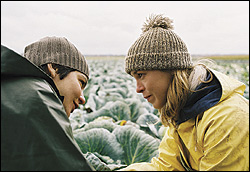“When you first start, you can get away with more,” Jason Plourde laughs, recalling the scrappy early years of Seattle’s Lesbian & Gay Film Festival. “One of the disappointing things is losing that ingenue status. You think twice when you’re an established organization.”
Plourde, who has been with the LGFF since its inception and is now its programming director, is, however, justly proud of the progress.
“We’ve definitely built a good reputation for ourselves,” he says. “People get that we take films seriously.”
They do take films seriously. What began 10 years ago at the Harvard Exit with an overdependence on celluloid skin opens this week (beginning Friday, Oct. 14; www.seattlequeerfilm.com) as a 10-day, 150-film (including shorts), multivenue event encompassing more than pec-tastic, man-on-man romps. Although a glance at the schedule proves that beefcake programming is still a necessity, it’s clearly not the priority anymore—and happily, says Plourde, such fare is becoming less omnipresent in the industry itself.
“There was a breadth of work to choose from,” he notes of this year’s selection process. “There was a lot of diversity in what was being made. There weren’t just 300 romantic comedies.”
“Diversity” isn’t tossed around as an easy, idealistic catchword here, either. The modest festival has always had its frustrating technical gaucheries—Beautiful Thing,now an acknowledged gay classic being given a special anniversary screening at the Cinerama on Oct. 19, began to play upside down as the first year’s opening-night feature. But it can rightfully boast a thoughtful effort to show the queer community in all its many expressions. This year, there’s an intriguing lineup of documentaries looking nostalgically back (Gay Sex in the ’70s) or musing uncertainly on the present (Gay Republicans). The hardship of homosexuality in other countries is well represented (Unveiled, about a lesbian Iranian refugee, looks promising). And gender—that nagging, increasingly slippery 21st-century concern—receives sharp focus, with local (Love Letter, about Seattle’s Queen Bees burlesque troupe) and even international efforts (Norway’s 100% Human biography of a male-to-female transsexual) exploring the expanding boundaries of what it means to be exactly who you are.
“The work is sort of catching up with the community,” says festival Executive Director Rachael Brister, considering the heartening amount of quality transgendered, transsexual, and gender-bending cinema, “and I think we got really lucky with that this year.”
Brister also comprehends the most crucial facet of the LGFF’s continued existence: “There’s still so much work out there being made that would never be screened without this festival.”
Of course, if you want to spend the entire 10 days with more familiar types of gay diversion, you can do that, too. In addition to Beautiful Thing, the festival is saluting the 10th anniversary of the cherished lesbian indie The Incredibly True Adventure of Two Girls in Love. You’re invited to sing along to ABBA: The Movie (directed by then- unknown Lasse Hallström, long before he hit Hollywood with What’s Eating Gilbert Grape?). San Francisco drag diva Peaches Christ, meanwhile, is hosting a midnight sing-along to Madonna’s seminal Truth or Dare (in which a pre-spiritual, very Material Girl ain’t so nice about Oprah), while alter-ego Joshua Grannell has an entire evening devoted to his short films.
And, yes, there is beef—vintage, yet: Warhol Factory icon Joe Dallesandro, who makes most of Hollywood’s male sex symbols look like so many earnest little boys, is reason enough to trudge through 1975’s dubious The Gardener.
Even Plourde will grant you that one: “He’s totally shirtless for the entire thing.”








